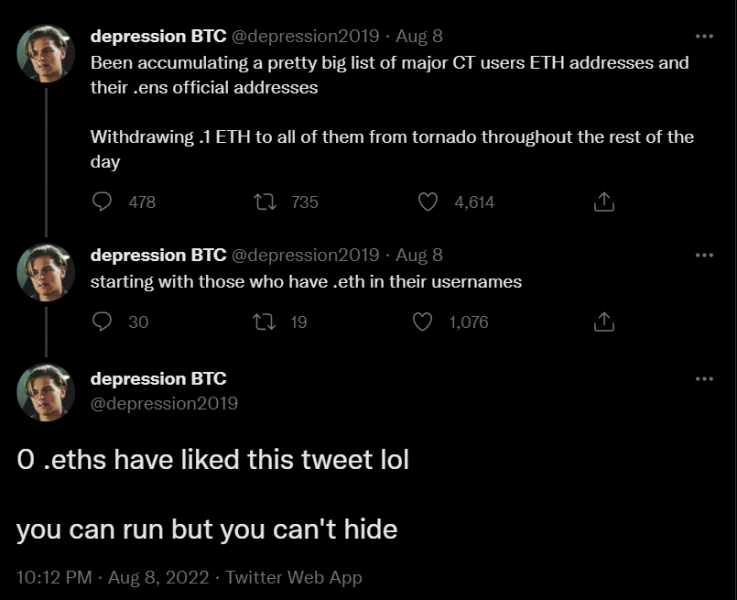
High-profile crypto wallets have had Ethereum (ETH) sent to their wallets in what appears to be a troll’s attempt to implicate them in US Treasury sanctions with crypto dust.
Comedian Dave Chappelle, Coinbase CEO Brian Amstrong, NFT artist Beeple, DJ Steve Aoki, Ethereum founder Vitalik Buterin and a number of others had 0.1 ETH sent to them via Tornado Cash, which was sanctioned on Monday.
What is Tornado Cash and why was it sanctioned?
It comes after The Treasury Department’s Office of Foreign Asset Control (OFAC) sanctioned Tornado Cash prohibiting US persons – people in the USA or American citizens abroad – or entities from transacting with the privacy tool.
Tornado Cash is a mixer, a protocol designed to pool funds in an effort to obfuscate the origin of a transaction. US officials have alleged that significant funds flowing through Tornado Cash were linked to criminal activities, with more than $7 billion in crypto laundered on the protocol since 2019.
One such attack was from The Lazarus Group, a notorious North Korean hacking organization that was previously linked to the Harmony Bridge attack, which depleted the protocol’s funds by $100 million.
Despite the network offering a $1 million reward for the funds’ return, the hacking group laundered them through Tornado Cash and according to one official used the program to launder a total of $450 million.
Who is behind the attack?
Various high-profile and celebrity Ethereum Name Service (ENS) wallets had their addresses dusted and were sent 0.1 ETH, with Twitter user Depression2019 claiming to be behind the stunt.
A message on the account read: “Been accumulating a pretty big list of major CT users ETH addresses and their .ens official addresses. Withdrawing .1 ETH to all of them from tornado throughout the rest of the day.
The account later retweeted screenshots of the on-chain transactions and said it would initially target ENS wallets, stating “you can run but you can’t hide.”
What do the sanctions mean?
The OFAC sanctions prohibit any US persons from economically engaging with Tornado Cash in any way.
According to guidance from the Treasury’s website, “US persons and persons otherwise subject to OFAC jurisdiction, including firms that facilitate or engage in online commerce or process transactions using digital currency, are responsible for ensuring that they do not engage in unauthorized transactions prohibited by OFAC sanctions, such as dealings with blocked persons or property, or engaging in prohibited trade or investment-related transactions.”
However, the stunt appears to be a deliberate troll attempt to see how far the US Treasury will reach and points out how such sanctions affect users from receiving funds from blacklisted addresses over which they have no power to decline.
According to the same guidelines, a US person who holds “blocked” currency – that received from a sanctioned wallet – must “deny all parties access to that virtual currency, ensure that they comply with OFAC regulations related to the holding and reporting of blocked assets, and implement controls that align with a risk-based approach.”
However, that would mean the address would have to be blocked completely as it isn’t possible to block an incoming transfer on-chain.
Several major crypto entities have complied with the sanctions, with Circle freezing USDC held in Tornado Cash and GitHub deleting accounts of Tornado Cash developers.
The news has been met with harsh criticism from the crypto community, however, who have stated concerns over privacy and censorship.
Related
Tamadoge - The Play to Earn Dogecoin
- '10x - 50x Potential' - CNBC Report
- Deflationary, Low Supply - 2 Billion
- Listed on Bybit, OKX, Bitmart, LBank, MEXC, Uniswap
- Move to Earn, Metaverse Integration on Roadmap
- NFT Doge Pets - Potential for Mass Adoption
